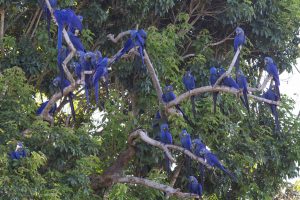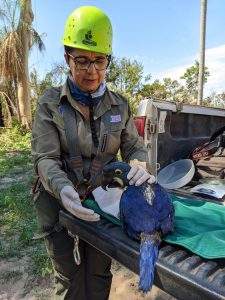
This month we travel to the Pantanal of Brazil, the world’s largest tropical wetland. It is a magical place, an epic ecosystem. Most years, the grasslands flood from torrential rains, and then the water slowly subsides leaving behind a lush landscape that attracts the highest concentration of wildlife on the continent. Everything in the Pantanal moves in sync with the water, from floods to deep droughts.
Native to the Pantanal biome are the equally magical hyacinth macaws. In the 1980s, it is estimated that 10,000 hyacinths had been captured by traffickers. As a young biologist in 1989, Neiva Guedes was enchanted and inspired when she saw 30 hyacinth macaws sitting in an old tree, and sadly learned that their numbers were rapidly declining. At that time, the population was estimated around 1,500. Since then, Neiva has dedicated her life to the conservation of the species, possibly even bringing it back from the brink of extinction. The current hyacinth macaw population is estimated at a hopeful 6,500.
However, this macaw has very unique needs which can leave it vulnerable. For example, 95% of hyacinth nests are found in the manduvi tree. However, many manduvi trees are felled to support Pantanal livestock farming. The hyacinths are also dependent for food on two specific palms – the acuri and the bocaiúva. So, like many conservation challenges, they face an increasing loss of habitat for both nesting and food production.
Instituto Arara Azul (Hyacinth Macaw Institute)

In 2003, Neiva Guedes founded the Instituto Arara Azul. Its mission is to “promote conservation and biodiversity, seeking rational usage of natural resources and better quality-of-life.” As we must understand, one species cannot survive alone. The Institute is now a sustainable organization composed of scientists and volunteers, dedicated to science, research, and environmental protection. It has many critical projects on its agenda, which I plan to write about in future posts. Phoenix Landing has sponsored several ecotours to Brazil, so I have had the honor of meeting Neiva and her extraordinary team and seeing their good works first-hand. I look forward to sharing more about their other crucial conservation projects later.
Fire in the Pantanal!
Thanks to the São Francisco do Perigara ranch in the Pantanal, and a cluster of bocaiúva palms reserved by the farm’s owner more than 50 years ago, the hyacinths found a major refuge. It has been home to about 20% of the overall hyacinth population. Since 2010, Neiva’s team has been allowed to add numerous artificial nests, in addition to the forest and manduvi trees already protected on the ranch. The macaw population slowly increased, and by 2014, they were actually taken off the endangered species list, thanks in some measure to this special ranch and the Hyacinth Macaw Institute. That’s the good news.

Now – the bad news. In 2019 and 2020, due to extreme drought and lack of firefighting resources, 92% of the Perigara region of the Pantanal was hit with unprecedented and devastating fires. The highest natural concentration of hyacinth macaws occurs in this region! Unfortunately, the fires also coincided with the hyacinth breeding season. At least 35% of the monitored nests were affected by this disaster. This is expected to affect their population for years to come, and could even put them back on the endangered list.
So, the most important current need for the Pantanal hyacinth macaws is recovering from the horrors of these fires. Neiva’s team has been busy adding more artificial nests, restoring the natural nests, supplementing food and water, and creating fire breaks. They really need our help to protect the remaining hyacinth population in this region.
Lafeber’s $500 GLOBAL PARROT conservation grant this month goes to the Instituto Arara Azul to assist with the resources needed to recover from the fires and to bring the hyacinth macaws back to prosperity in key locations in the Pantanal. You can also help, please! To make a tax-deductible donation go to https://parrotsinternational.org/index.php/donate/ and choose the Hyacinth Macaw Project.
To learn more about the Pantanal hyacinth macaw conservation efforts, here are some informative links:
